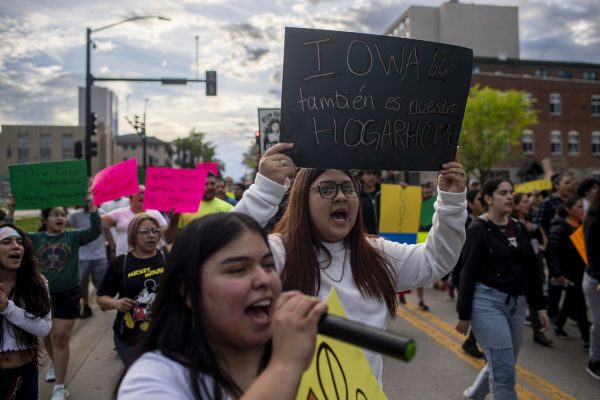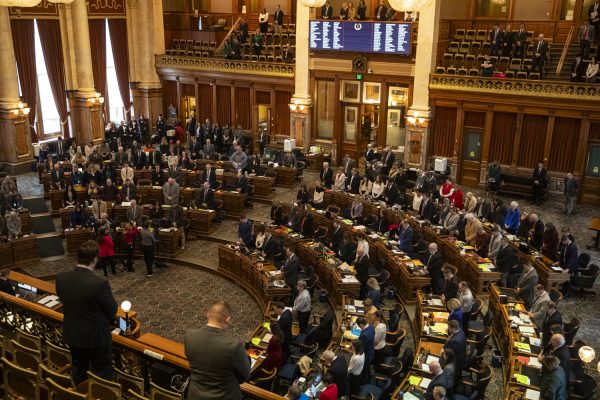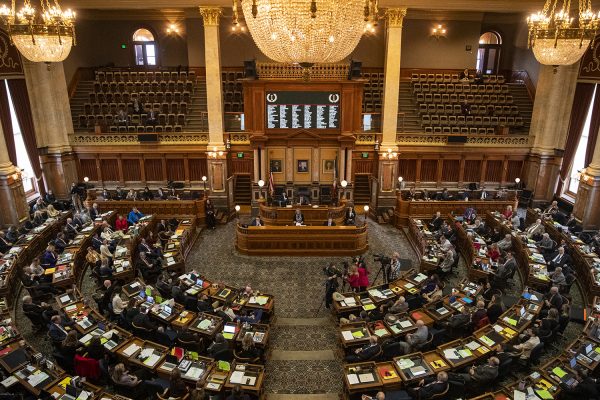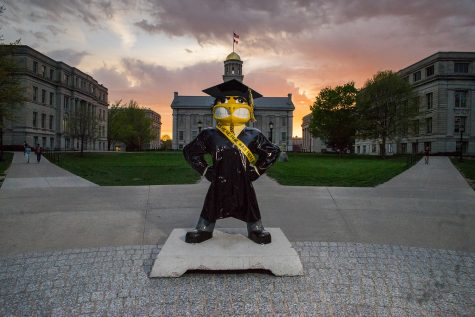How would a proposed constitutional amendment affect abortion laws in Iowa?
A proposed amendment to the Iowa constitution to specify that the document does not grant the right to an abortion passed the Senate last week, but it’s not for certain whether the amendment will eventually become law, or what the effects of the amendment would be.
Gov. Kim Reynolds speaks during the Condition of the State address at the Iowa State Capitol on Jan. 14.
February 23, 2020
The proposed amendment to specify the Iowa constitution doesn’t grant the right to an abortion is two years away from passage at the earliest — and the effects of the resolution passing are not totally clear to lawmakers.
Senate Joint Resolution 2001 passed the Iowa Senate on Feb. 13 along party lines, meaning the bill hurdled past the Feb. 21 funnel deadline. Thirty-two senate Republicans voted in favor and 18 senate Democrats voted against the proposal.
The amendment awaits passage in the Iowa House, and lawmakers are slated to hold a public hearing on the amendment Tuesday evening.
How does a constitutional amendment pass?
A constitutional amendment requires passage by two consecutive General Assemblies, then needs to be ratified by a majority of voters in the next election — 2022 at the earliest.
UI law Professor Todd Pettys said past Iowa Supreme Court rulings, such as a 2018 decision striking down a 72-hour waiting period, enshrined a right to an abortion under the state constitution.
“If the proposed constitutional amendment ultimately passes, that will take away the state constitutional right to abortion,” Pettys said. “But it won’t have effect on any federal constitutional right to abortion that might still exist at that time.”
Pettys said the effects of the constitutional amendment would largely depend on what happens with abortion rights at the federal level.
“However, if the United States Supreme Court continues to chip away at the right to abortion or takes it away altogether and overrules Roe v. Wade, then women in Iowa are going to see a huge change, because their constitutionally protected right to abortion won’t exist at all,” Pettys said.
Iowa last amended the state constitution in 2010, when voters approved a proposal to create a natural resources and outdoor recreation trust fund.
Iowa Sen. Joe Bolkcom, D-Iowa City, said if lawmakers and voters approve the amendment, there would likely be an attempt by Republicans to implement restrictions on abortion similar to the heartbeat bill, which would’ve banned abortion after a heartbeat could be detected. A Polk County District judge struck down that law in January 2019.
Bolkcom said he thought it would be a challenge for the amendment to pass a popular vote because of public opinion about abortion in Iowa.
Data from the Pew Research Center show that in 2014, 52 percent of Iowans believed abortion should be legal in all or most cases.
“It’ll be a big challenge for this to pass. The polling numbers are on the side of personal freedom and women’s ability to control their own bodies,” Bolkcom said. “I think it’ll be a challenge for the anti-choice crowd to make their case, but you never know.”
Iowa Sen. Mariannette Miller-Meeks, R-Ottumwa, said she is unsure how the public would vote upon the proposed amendment. Miller-Meeks voted in favor of the amendment along with all 31 senate Republicans.
“It’s a lengthy process, a deliberative process. I think the prospects are good that it would pass through the House — what the decision of the public would be upon voting for it, I do not know,” said Miller-Meeks, who is also running for Iowa’s 2nd Congressional Disrict seat in the U.S. House.
What would passing the amendment mean for abortion laws in Iowa?
Iowa Sen. Zach Wahls, D-Coralville, said there is a possibility that Republican lawmakers will attempt to pass a complete ban on abortion if the constitutional amendment clears the Legislature and voters approve it.
In Alabama, a law was passed to completely ban abortion with no exceptions for rape or incest.
“I’m really concerned about what the effects of this would be,” Wahls said. “It’s important to be clear that this legislation would not ban abortion, it would legalize the banning of abortion — but that is, given the laws this state has already passed, essentially the same thing.”
Miller-Meeks said by introducing an amendment, Republican lawmakers want to put the question of abortion rights to a statewide vote.
“What we want is for more people, the public, to have a voice in what the law should be and whether or not there should be any restrictions,” Miller-Meeks said.
Drew Zahn, communications director for The Family Leader, a conservative Christian group which has lobbied in support of the amendment, said the amendment itself would not change any laws surrounding abortion.
“The good news I think, for that process is, when you talk about putting it before the people is that the amendment itself does not ban any abortions. It wouldn’t change Iowa’s abortion law,” Zahn said. “It simply puts the question of how we are going to reasonably regulate abortion in this state back in the hands of the elected representatives.”
Erin Davison-Rippey, Iowa executive director for Planned Parenthood of the Heartland, said in a phone interview that the current proposed amendment in Iowa is similar to an amendment passed in Tennessee in 2014. The U.S Supreme Court declined to hear a challenge to Tennessee’s amendment.
“Tennessee passed a similar constitutional amendment — they sold it as this way to restore power to the legislature,” Davison-Rippey said. “Since the point of that constitutional amendment being adopted, Tennessee lawmakers have passed seven laws aimed at closing abortion clinics.”
Editor’s note: The Daily Iowan incorrectly stated that the Iowa Supreme Court struck down the fetal heartbeat bill in January 2019. A Polk County District judge struck down the law. The DI regrets the error.
















